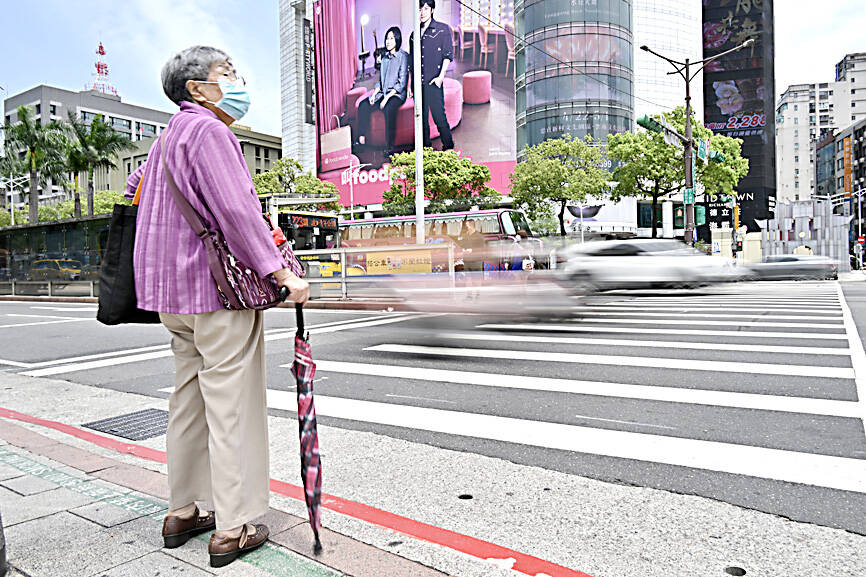The Executive Yuan is to allocate NT$40 billion (US$1.25 billion) over the next four years to reduce pedestrian casualties by 30 percent by 2030 after a pedestrian safety policy framework was passed at a Cabinet meeting earlier yesterday.
The Cabinet passed the framework ahead of a “Stop Killing Pedestrians” protest on Sunday organized by the Vision Zero Alliance.
New Taipei City Mayor Hou You-yi (侯友宜), the Chinese Nationalist Party’s (KMT) presidential candidate, and Taiwan People’s Party Chairman Ko Wen-je (柯文哲), its candidate, have said they might attend the rally.

Photo: Tu Chien-jung, Taipei Times
The Ministry of Transportation and Communications said that the framework sets short, medium and long-term goals.
The most important of the short-term, or six-month, goals is to forward the draft road traffic safety basic act to the legislature next month, the ministry said.
Another short-term goal would be to establish a Cabinet-level road traffic safety meeting, which would be presided over by Premier Chen Chien-jen (陳建仁), it said.
The government is to spend NT$40 billion to improve pedestrian safety, including changing road layouts at 600 sites across Taiwan deemed to be accident-prone or where crowds gather, it said.
Progress reports on the safety improvements would be published every six months, the ministry said.
The medium-term, or one-year, goals would focus on drafting statutes of pedestrian safety facilities, it said.
The statutes would identify important pedestrian facilities, their key performance indicators, and mechanisms to manage and assess them, the ministry said.
The statutes would also ensure that a mechanism is in place to hold local government officials accountable for transportation facilities under their jurisdiction, it said.
The draft road traffic safety basic bill stipulates that the central government would be obligated to provide a national road traffic safety master plan every four years, while the ministry would be in charge of promoting the plan and local governments would enforce it, the ministry said.
To improve vehicle management systems, drivers and motorcyclists who have repeatedly contravened traffic regulations would be given a temporary license when they apply for a renewal, the ministry said.
They would not receive their new license until they address any unpaid fines and pass a defensive driving course, it said.
Any increases in funding for highway bus operators would be prioritized for operators in central, southern and eastern Taiwan, as well as on outlying islands, it said.
Among the long-term, or four-year, goals, a road test would be required to receive a scooter license, it said.
To help increase use of public transportation, the Executive Yuan would continue to promote T-Pass monthly access cards across Taiwan, the ministry said.
From next year to 2030, NT$64.3 billion would be spent to switch all city buses to electric, it said.
The ministry said that it would promote the use of bicycles and other shared vehicles as the “last mile” of public transportation.
Road authorities should pinpoint hazards at high-risk locations and adopt preventative measures, as part of a safety management system to help them plan, design and build roads, it added.

The CIA has a message for Chinese government officials worried about their place in Chinese President Xi Jinping’s (習近平) government: Come work with us. The agency released two Mandarin-language videos on social media on Thursday inviting disgruntled officials to contact the CIA. The recruitment videos posted on YouTube and X racked up more than 5 million views combined in their first day. The outreach comes as CIA Director John Ratcliffe has vowed to boost the agency’s use of intelligence from human sources and its focus on China, which has recently targeted US officials with its own espionage operations. The videos are “aimed at

STEADFAST FRIEND: The bills encourage increased Taiwan-US engagement and address China’s distortion of UN Resolution 2758 to isolate Taiwan internationally The Presidential Office yesterday thanked the US House of Representatives for unanimously passing two Taiwan-related bills highlighting its solid support for Taiwan’s democracy and global participation, and for deepening bilateral relations. One of the bills, the Taiwan Assurance Implementation Act, requires the US Department of State to periodically review its guidelines for engagement with Taiwan, and report to the US Congress on the guidelines and plans to lift self-imposed limitations on US-Taiwan engagement. The other bill is the Taiwan International Solidarity Act, which clarifies that UN Resolution 2758 does not address the issue of the representation of Taiwan or its people in

US Indo-Pacific Commander Admiral Samuel Paparo on Friday expressed concern over the rate at which China is diversifying its military exercises, the Financial Times (FT) reported on Saturday. “The rates of change on the depth and breadth of their exercises is the one non-linear effect that I’ve seen in the last year that wakes me up at night or keeps me up at night,” Paparo was quoted by FT as saying while attending the annual Sedona Forum at the McCain Institute in Arizona. Paparo also expressed concern over the speed with which China was expanding its military. While the US

SHIFT: Taiwan’s better-than-expected first-quarter GDP and signs of weakness in the US have driven global capital back to emerging markets, the central bank head said The central bank yesterday blamed market speculation for the steep rise in the local currency, and urged exporters and financial institutions to stay calm and stop panic sell-offs to avoid hurting their own profitability. The nation’s top monetary policymaker said that it would step in, if necessary, to maintain order and stability in the foreign exchange market. The remarks came as the NT dollar yesterday closed up NT$0.919 to NT$30.145 against the US dollar in Taipei trading, after rising as high as NT$29.59 in intraday trading. The local currency has surged 5.85 percent against the greenback over the past two sessions, central